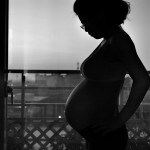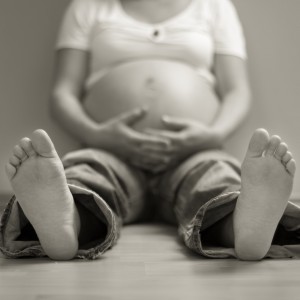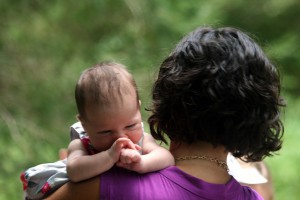
Compared to the rate for males in most developed countries, the suicide rate in females is comparatively low. Suicide is rarer still in females during the perinatal period (usually defined as the time of pregnancy up to and including one year after giving birth).
Despite this seeming rarity, suicide now represents the leading cause of maternal mortality in developed nations (Oates, 2003), principally as more physiological causes of maternal death, such as haemorrhage, obstetric embolisms, and pre-eclampsia/eclampsia, have become rarer with the routine health screening and care that pregnant women in developed nations now receive (Palladino et al, 2011).
Around one-quarter (24%) to just under one-half (49%) of UK women referred to psychiatric services for postpartum depression have a history of attempting suicide. However, only one in ten (10%) of these women are specifically referred to psychiatric services for self-harm and/or suicidal behaviour (Healey et al, 2013), suggesting that suicidal behaviour in perinatal women is likely to be significantly under-reported.
Pregnancy represents a period of a woman’s life in which she has increasingly frequent contact with health care providers and thus would provide the ideal opportunity to identify those at risk of suicide, if only more was known about the risk factors for suicide during this period (Gold et al, 2012). Unfortunately, however, there have been relatively few investigations into the epidemiology of suicide during the perinatal period.

Suicide is a leading cause of maternal mortality in developed countries.
Methods
The authors of a recent study (Khalifeh et al, 2016) used data from the UK National Confidential Inquiry into Suicide and Homicide by People with Mental Illness (NCISH). Established in 1992, the NCISH records information on all UK residents aged 10 or older who have been in receipt of psychiatric care (e.g., outpatient, day, inpatient, or crisis home treatment) in the 12 months preceding a death by suicide or homicide perpetration. Inquiry data is collected in 3 stages:
- Data on all suspected suicides in the UK (e.g., deaths recorded as either a suicide or an open verdict following a coroner’s inquest) are collected from the national registries in England and Wales, Scotland, and Northern Ireland;
- Psychiatric providers (both public and private) in the decedent’s usual place of residence and/or place of death are contacted to establish whether or not the person had been in contact with psychiatric services in the 12 months preceding their death;
- For those decedents found to have been in contact with psychiatric services within 12 months preceding their death, structured questionnaires are sent to the consultant psychiatrist responsible for the care of that patient to obtain information on demographic factors (e.g., age, gender, pregnancy status) and clinical factors (e.g., primary psychiatric diagnosis, duration of mental illness, types of treatment received, etc.)
Results
For the purposes of this study, the authors extracted data on women, between 16 and 50 years of age, who died by suicide between 1997 and 2012 (N = 5,135), although due to missing data on timing of the suicide with reference to perinatal period, the study sample was reduced to (N=4,785). Of these, 98 (2.0%) died within the first perinatal year:
- 80 (1.7%) women died by suicide during the first year following the birth of a child;
- 18 (0.4%) women died by suicide during pregnancy.
The authors found evidence of a modest, but significant, reduction in the mean number of women who died by suicide in the 15 year period between 1997 and 2012 (-2.07 women per year; standard deviation [SD] = 0.96; p = 0.03). However, there was no evidence of a similar reduction in the mean number of women who died by suicide during the perinatal period over this same time frame (-0.07 women per year; SD = 0.36; p = 0.58).
Compared to women who died by suicide outside of the perinatal period, those who died during pregnancy or within the first year following the birth of a child were:
- Younger: mean difference (MD) -6.39 (95% confidence interval (CI) -8.15 to -4.62); 4,785 participants
- Married: odds ratio (OR) 4.46 (95% CI 2.93 to 6.80); 4,724 participants (although it should be noted that I could not independently calculate this OR as data were reported as proportions for the perinatal group and as means and SDs for the non-perinatal group)
- Diagnosed with depression: OR 2.06 (95% CI 1.38 to 3.09); 4,745 participants
- Illness duration of less than 1 year: OR 3.74 (95% CI 2.47 to 5.68); 4,665 participants
Compared to women who died by suicide outside of the perinatal period, those who died within the perinatal period were:
- Admitted to psychiatric facilities (ever): OR 0.60 (95% CI 0.40 to 0.91); 4,770 participants
- Prescribed any form of psychiatric medication (at the time of death): OR 0.53 (95% CI 0.30 to 0.91); 4,058 participants
- Received any form of psychiatric medication, psychological therapy, or other non-pharmacological treatment (at the time of death): OR 0.45 (95% CI 0.24 to 0.82); 4,151 participants
- Diagnosed with alcohol misuse (in the past 3 months): OR 0.44 (95% CI 0.23 to 0.84); 4,703 participants
- Violent towards another person (ever): OR 0.47 (95% CI 0.23 to 0.98); 4,693 participants.
Risk factors
Following adjustment for socio-demographic factors, such as age, ethnicity, marital status, and employment status, the following risk factors remained significantly associated with an increased risk of suicide during the perinatal period:
- Diagnosis of depression: OR 2.19 (95% CI 1.43 to 3.34); 4,745 participants
- Illness duration of less than 1 year: OR 2.93 (95% CI 1.88 to 4.56); 4,665 participants.
Whilst the following factors remained significantly associated with a reduced risk of suicide in the perinatal period:
- Diagnosis of alcohol misuse in the past 3 months: OR 0.47 (95% CI 0.24 to 0.92); 4,703 participants.
Following adjustment for the above socio-demographic factors and clinical characteristics, such as depression diagnosis, alcohol misuse, drug misuse, personality disorder, illness duration, and history of psychiatric admissions, none of the above risk factors remained significantly associated with the risk of dying by suicide in the perinatal period.
Methods of suicide
In terms of suicide method, women who died within the perinatal period were significantly more likely to use:
- Violent methods: OR 2.07 (95% CI 1.32 to 3.24); 4,742 participants.
And were significantly less like to use:
- Non-violent methods: OR 0.47 (95% CI 0.30 to 0.73); 4,742 participants.
- Self-poisoning using any substance: OR 0.58 (95% CI 0.37 to 0.91); 4,742 participants.
- Self-poisoning using psychiatric medications: OR 0.23 (95% CI 0.08 to 0.63); 4,742 participants.

Women who ended their own lives during the perinatal period were significantly more likely to use violent methods.
Conclusions
The authors found that, compared to women who die by suicide at any other time in their lives, those who die by suicide in the perinatal period (i.e., during pregnancy or within one year following to birth of a child) are significantly more likely to have a recent onset of depression, are less likely to be receiving active treatment, and particularly medication, at their time of their death, and are more likely to use violent means to end their lives.

Perinatal suicide is linked with recent onset of depression.
Strengths and limitations
Surprisingly, the authors found no difference in medication adherence in the month preceding suicide for those women prescribed psychiatric medication. Medication non-adherence has been advanced as one risk factor for increased suicide risk in perinatal women. Previous research, for example, suggests that among those women who remain adherent throughout their pregnancy, around one-quarter (26%) will experience a relapse of depression compared with over half (68%) of those who discontinue medication. Women who discontinue medication have also been found to experience more frequent relapses over the course of their pregnancy compared with women who continue to remain adherent to their antidepressant medications (hazard ratio 5.00, 95% CI, 2.80 to 9.10) (Cohen et al, 2006).
It remains possible that whilst some of the women in this study discontinued medication in the first trimester, they reintroduced antidepressant therapy after the first trimester of pregnancy thereby attenuating the association between medication adherence and suicide, which is particularly relevant as this study only measured adherence with prescribed medication in the month preceding suicide. The reintroduction of antidepressant therapy during pregnancy (i.e., after the first trimester but before the birth of the child) is, however, common although this has been found to only modestly attenuate the risk of experiencing relapse of a depressive episode, and hence the risk of suicide, as compared to sustaining antidepressant therapy throughout the pregnancy (Cohen et al, 2006).
Additionally, as only women in contact with psychiatric services within one year prior to death were included, the present study cannot assist with the identification of risk factors for suicide in the perinatal period in those who have not been in contact with psychiatric services. Help-seeking rates from professional mental health services remains low for pregnant women (O’Mahen et al, 2008; Fonseca et al, 2015). Therefore, the women included in this cohort likely reflect more acutely ill patients. Results of this study may therefore not generalise to those without significant psychiatric morbidity.
Summary
- Around 1 in 50 female suicides in mental health patients occur during the perinatal period
- Women who die by suicide during the perinatal period (compared to women who die by suicide outside of the perinatal period) are:
- more likely to use violent, and therefore highly lethal means
- more likely to have been recently diagnosed with depression
- less likely to be receiving any form of active treatment, including antidepressant medications, at the time of their death.
Routine assertive follow-up should be provided to all women in the perinatal period to address the risk of suicide.

Routine assertive follow-up should be provided to all women in the perinatal period to address suicide risk.
If you need help
If you need help and support now and you live in the UK or the Republic of Ireland, please call the Samaritans on 116 123.
If you live elsewhere, we recommend finding a local Crisis Centre on the IASP website.
We also highly recommend that you visit the Connecting with People: Staying Safe resource.
Links
Primary paper
Khalifeh H, Hunt IM, Appleby L, Howard LM. (2016). Suicide in perinatal and non-perinatal women in contact with psychiatric services: 15 year findings from a UK national inquiry. Lancet Psychiatry 2016 3: 233-42.
Other references
Cohen LS, Altshuler LL, Harlow BL. (2006). Relapse of major depression during pregnancy in women who maintain or discontinue antidepressant treatment. JAMA 2006 295: 499-507.
Fonseca A, Gorayeb R, Canavarro MC. (2015). Women’s help-seeking behaviours for depressive symptoms during the perinatal period: Socio-demographic and clinical correlates and perceived barriers to seeking professional help. Midwifery 2015 31: 1177-85.
Gissler M, Berg C, Bouvier-Colle MH, et al. (2005). Injury deaths, suicides and homicides associated with pregnancy, Finland 1987-2000. Eur J Pub Health 2005 15: 459-63. [PubMed abstract].
Gold KJ, Singh V, Marcus SM, Palladino CL. (2012). Mental health, substance use and intimate partner problems among pregnant and postpartum suicide victims in the National Violent Death Reporting System. Gen Hosp Psychiatry 2012 34: 139-45. [PubMed abstract].
Healey C, Morriss R, Henshaw C, et al. (2013). Self-harm in postpartum depression and referrals to a perinatal mental health team: An audit study. Arch Womens Ment Health 2013 16: 237-45. [PubMed abstract].
Oates M. (2003). Suicide: The leading cause of maternal death. Br J Psychiatry 2003 183: 279-81.
O’Mahen HA, Flynn HA. (2008). Preferences and perceived barriers to treatment for depression during the perinatal period. J Womens Health 2008 17:1301-9.
Palladino CL, Singh V, Campbell J, Flynn H, et al. (2011). Homicide and suicide during the perinatal period: Findings from the National Violent Death Reporting System. Obstet Gynecol 2011 118: 1056-63. [PubMed abstract].

Suicide during the perinatal period https://t.co/8iJfOvctAI #MentalHealth https://t.co/BhReGIc75O
Impt epidemiological study #perinatal #suicide -so much work needed to tackle this&reduce devastating consequences https://t.co/loy74Ux4oF
Hi @DrHKhalifeh @ProfLAppleby We’ve blogged about your “Suicide in perinatal & non-perinatal women” study https://t.co/KsJ11MwSFt
Recent @TheLancetPsych study informs #SuicidePrevention for women with mental illness during or after pregnancy https://t.co/KsJ11MwSFt
New paper highlights potential serious risks of untreated severe depression in the perinatal period https://t.co/KsJ11MwSFt @SWMH_IoPPN
RT @picardonhealth: #Suicide is the leading cause of death during the perinatal period, by @Mental_Elf https://t.co/ONhbP7SdYZ @AllenFrance…
RT @Mental_Elf: Suicide is a leading cause of maternal mortality in developed countries https://t.co/KsJ11MwSFt Stay safe: https://t.co/Hho…
RT @Mental_Elf: Today @qu1t1 summarises 15 year UK findings on suicide in women during pregnancy & postnatal period https://t.co/KsJ11MwSFt…
A blind person could see it. Why is the correlation between the antidepressants and suicide identified? Was your study financed by pharmaceutical companies?
ISN’T
[…] Suicide during the perinatal period Sign in or Register Now to reply […]
Thanks to Mental Elf for sharing the findings of our study.
Treatments (psychological, medication, social) for antenatal and postnatal mental illnesses are available and effective (see NICE Guidance weblink below):
https://www.nice.org.uk/guidance/cg192/ifp/chapter/about-this-information
Barriers to effective treatment include women not disclosing mental illness and / or clinicians not identifying it. Help can be accessed via GP in the first instance, and if necessary via referral to a psychiatrist. The following resources may be helpful:
1. Royal College of Psychiatrists Health Advice http://www.rcpsych.ac.uk/healthadvice/problemsdisorders.aspx
• Information on various mental health problems, medication and talking therapies
• Perinatal Leaflets on:
Planning a Pregnancy
http://www.rcpsych.ac.uk/healthadvice/treatmentswellbeing/planningapregnancy.aspx
Mental Health in Pregnancy
http://www.rcpsych.ac.uk/healthadvice/problemsdisorders/mentalhealthinpregnancy.aspx
Postnatal Depression http://www.rcpsych.ac.uk/healthadvice/problemsdisorders/postnataldepression.aspx
Postpartum Psychosis http://www.rcpsych.ac.uk/healthadvice/problemsdisorders/postpartumpsychosis.aspx
Perinatal OCD
http://www.rcpsych.ac.uk/healthadvice/problemsdisorders/perinatalocd.aspx
2. Netmums
http://www.netmums.com
• Information and support on many aspects pregnancy and parenting
• Information about local resources and support
• Support for depression and anxiety:
Netmums Parent Supporters are a trained team of parents, available to provide you with information and support on a daily basis.
http://www.netmums.com/parenting-support/depression-and-anxiety
Netmums Helping With Depression Course – Based on Cognitive Behavioural Therapy and aimed at mums with low mood or those who have been diagnosed with mild to moderate postnatal depression. Written in consultation with the University of Exeter, Psychology Department. It consists of 11 weekly sessions that build onto each other and are emailed directly to you. You will be able to use the PND online chat board.
http://www.netmums.com/parenting-support/depression-and-anxiety/helping-depression-sign-up
3. Association for Postnatal Illness
http://www.apni.org
Information leaflets for women with postnatal mental illness.
Support by phone and post from women who have experienced postnatal mental illness
4. PANDAS Foundation
http://www.pandasfoundation.org.uk
Antenatal and postnatal depression information and support for women and families. Support groups and helpline.
Deirdre Naughton
RT @Mental_Elf: Don’t miss: Suicide during the perinatal period https://t.co/KsJ11MwSFt #EBP
Interesting article about female suicide during the perinatal period (the time of pregnancy up to and including… https://t.co/IJrdwv4BBV
RT @Mental_Elf: Thanks @DrHKhalifeh for sharing useful resources on our blog about suicide during pregnancy & postnatal period https://t.co…
this reality needs to change urgently Suicide during the perinatal period https://t.co/HdVteFCN47 via @sharethis #perinatal #maternaldeath
Another interesting article from Mental elf https://t.co/XU8qZvyAwB
Suicide during the perinatal period https://t.co/t0sJ6NbzbL via @sharethis
RT @Mental_Elf: All women should get routine assertive perinatal follow-up to address suicide risk https://t.co/CfzYeKi7SV https://t.co/8zW…
[…] 1Suicide during the perinatal period-Mental Elf Blog post. […]
Sobering reading: #Suicide during the #perinatal period #maternal #perinatal #mentalhealth https://t.co/kJKRg7xXc2 via @sharethis
Suicide during the perinatal period https://t.co/OBdif1DxKU
[…] factors in suicidal ideation. There's this report on suicide during the perinatal period. Suicide during the perinatal period http://www.medscape.com/viewarticle/857648 Sign in or Register Now to […]